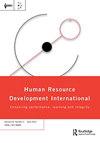The COVID-19 impact on employee performance and satisfaction: a moderated moderated-mediation conditional model of job crafting and employee engagement
IF 3.8
Q2 MANAGEMENT
引用次数: 8
Abstract
ABSTRACT Human Resource Development (HRD) is indispensable for the success of any organization; educational institutions are not an exception. The unprecedented outbreak of COVID-19 brought a paradigmatic shift in educational work cultures from supporting primarily face-to-face teaching to online teaching. The global pandemic posed substantial, unique challenges for HRD professionals in educational institutions as they sought to best manage the sudden change. Drawing from the HRD literature we found two promising research variables, job crafting and employee engagement that could help mitigate the ill effects of COVID-19 on performance and satisfaction in higher educational institutions. Based on the Job Crafting Theory (JCT) and Job Demands-Resources (JD-R) theoretical frameworks, we developed a conceptual model and examined the relationships among COVID-19 Impact, employee job performance, and satisfaction. We used a carefully crafted survey instrument and collected data from 640 faculty members working in educational institutions. After checking the instrument’s psychometric properties using the LISREL software of structural equation modelling, we used Hayes’s PROCESS for testing the hypothesized relationships. The results indicate that COVID-19 Impact is negatively related to job performance and satisfaction. However, the results also support that performance is a mediator in the relationship between COVID-19 Impact and satisfaction. Further, job crafting acted as a moderator in reducing the negative effect of COVID-19 on performance. Perhaps most importantly, employee engagement (second moderator) moderates the moderated-mediation relationship between job crafting (first moderator) and COVID-19 Impact on satisfaction, mediated through employee performance. Overall, the study results reveal that the three-way interaction between COVID-19 Impact, job crafting, and employee engagement on employee performance provides a novel way of explaining the complex relationships in minimizing the adverse effects of the global pandemic. The implications for HRD theory and practice are discussed.新冠肺炎对员工绩效和满意度的影响:工作制定和员工敬业度的调节-中介条件模型
人力资源开发(HRD)是任何组织成功的必要条件;教育机构也不例外。前所未有的2019冠状病毒病疫情带来了教育工作文化的范式转变,从主要支持面对面教学转向在线教学。全球大流行病给教育机构的人力资源开发专业人员带来了巨大而独特的挑战,因为他们试图最好地应对突如其来的变化。根据人力资源开发文献,我们发现了两个有希望的研究变量,即工作制定和员工敬业度,这有助于减轻COVID-19对高等教育机构绩效和满意度的不良影响。基于工作制作理论(Job Crafting Theory, JCT)和工作需求-资源(Job requirements - resources, JD-R)理论框架,我们构建了一个概念模型,并考察了COVID-19影响、员工工作绩效和满意度之间的关系。我们使用了一种精心制作的调查工具,收集了640名在教育机构工作的教员的数据。在使用LISREL结构方程建模软件检查仪器的心理测量特性后,我们使用Hayes 's PROCESS来检验假设的关系。结果表明,COVID-19影响与工作绩效和满意度呈负相关。然而,结果也支持绩效是COVID-19影响与满意度之间关系的中介。此外,工作制定在减少COVID-19对绩效的负面影响方面发挥了调节作用。也许最重要的是,员工敬业度(第二调节因子)调节了工作制作(第一调节因子)与COVID-19对满意度的影响之间的调节中介关系,通过员工绩效进行中介。总体而言,研究结果表明,COVID-19影响、工作制定和员工敬业度之间的三方互动对员工绩效的影响,为解释最大限度地减少全球大流行的不利影响的复杂关系提供了一种新颖的方式。讨论了人力资源开发理论和实践的意义。
本文章由计算机程序翻译,如有差异,请以英文原文为准。
求助全文
约1分钟内获得全文
求助全文
来源期刊

HUMAN RESOURCE DEVELOPMENT INTERNATIONAL
MANAGEMENT-
CiteScore
11.40
自引率
11.10%
发文量
43
期刊介绍:
Human Resource Development International promotes all aspects of practice and research that explore issues of individual, group and organisational learning and performance. In adopting this perspective Human Resource Development International is committed to questioning the divide between practice and theory; between the practitioner and the academic; and between traditional and experimental methodological approaches. Human Resource Development International is committed to a wide understanding of ''organisation'' - one that extends through self-managed teams, voluntary work, or family businesses to global enterprises and bureaucracies. Human Resource Development International also commits itself to exploring the development of organisations and the life-long learning of people and their collectivity (organisation), their strategy and their policy, from all parts of the world. In this way Human Resource Development International will become a leading forum for debate and exploration of the interdisciplinary field of human resource development.
 求助内容:
求助内容: 应助结果提醒方式:
应助结果提醒方式:


